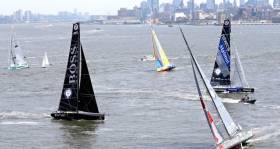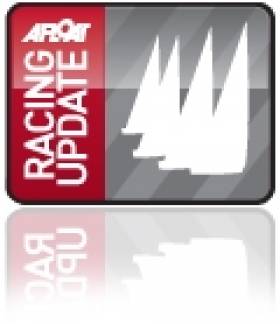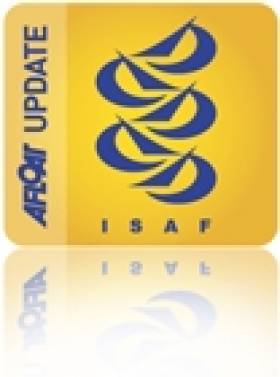Displaying items by tag: Gordon Davies
Racing Rules of Radio Sailing is Published Thanks to Pioneering Work of Irish Umpire Gordon Davies
Racing between radio controlled sailing boats continues to develop as an important part of world sailing and now thanks to ten years of work by Ireland's Gordon Davies and others this branch of the sport now has its own dedicated 'Call Book'.
Download a pdf of the book below
Radio-controlled racing attracts competitors of all ages and experience, from school and junior sailors to experienced sailors who may have retired from racing dinghies or keelboats. Racing can take place on small ponds or large lakes or, occasionally, on open water.
 International Judge Gordon Davies who hails from Bray Sailing Club in County Wicklow Photo: Afloat
International Judge Gordon Davies who hails from Bray Sailing Club in County Wicklow Photo: Afloat
Davies, a former Racing Rules Chairman of the International Radio Sailing Association, with input from many sailors and officials, led the development that resulted in the publication of the first case book (as it was then titled) in 2015.
Since then the interpretations have been developed and refined to resolve problems arising at events and to address some practices that had grown over time and were not consistent with the RRS and authoritative WS publications.
In 2020 the copyright of the Call Book was transferred by the original authors to World Sailing (WS). This is the first edition approved by World Sailing.
This edition updates the calls to ensure compliance with the Racing Rules of Sailing for 2021 – 2024; it also introduces new calls and fine-tunes the existing text.
As boats head across the Atlantic in the New York – Vendée race it is not only potential Irish competitors in the Vendée Globe who are keeping a watchful eye on proceedings. Gordon Davies, an International Judge from Bray, is monitoring events carefully as a member of the International Jury.
The Jury has a particular role to play in these oceanic races. This is very much a professional sport, with the finance depending on the media impact of the event. The Jury acts as a guarantee that the principles of sportsmanship are respected. At the same time they contribute to ensuring that the race remains a spectacle that attracts the public’s attention.
So, for instance, protests are heard while boats are still at sea, carried out by e-mail. Penalties are taken at sea, whenever possible by sailing through a virtual gate and then re-sailing through the same gate the required number of hours later.
Boat on boat protests are rare, but can occur from time to time.
Essential, but little used, items of safety equipment are sealed in place on the boat, to avoid any temptation of ‘stacking’ (moving heavy items to the windward side of the boat). The drive shaft is also sealed. Measurement protests for broken seals were frequent, but there are fewer nowadays as competitors have learnt to secure heavy items. Penalties for accidentally broken seals are small, a matter of a few minutes, but there is a policy of not giving a zero penalty. Even a few minutes penalty can be important as close finishes on oceanic races are not unknown.
Another source of protests is for sailing within forbidden zones. Single and short-handed sailing are at best tolerated in many countries. All participants in the sport have a responsibility to ensure that maritime authorities are not given cause to complain. Sailing a large yacht single-handed through crowded shipping lanes is probably not the best way to avoid problems with commercial traffic. Increasingly, Traffic Separation Schemes are declared forbidden zones. In effect the playing field is moved away from the areas where commercial shipping is densest. Other forbidden zones may be set up to avoid ice or other dangers.
Competitors are tracked as they sail the race. Race Committee’s do not hesitate to protest a boat that enters a forbidden zone. As a result there may be protest from the Race Committee. Penalties for breaking this rule may seem harsh, but race organisers must demonstrate clearly to maritime authorities that they are determined that professional sport will not interfere with commercial traffic.
The work of the International Jury is important in these events. Unfortunately, perhaps, in the age of modern telecommunications, the work is carried out from home. Only one or, possibly, two, judges will travel to the race venue. The others work from home (or wherever they happen to be) via computer, laptop or smartphone.
Judging oceanic races is becoming a specialised discipline. There are complex rules for equipment and safety. Ireland if fortunate in having two International Race Officials who are regularly involved as race officials- Bill O’Hara (Volvo Ocean Race, Transat Bakerly…) and Gordon Davies (New York Vendée, Transat Bakerly, Transat Jacques Vabre, Route du Rhum)
International Radio Sailing Association (IRSA) Publishes Case Book for Radio Sailing
#radiosailing – The International Radio Sailing Association (IRSA) Case Book for Radio Sailing has been published in online form. This document is undergoing a process similar to the development of the Team Racing Call Book (indeed some of the same people were involved). Naturally the IRSA Cases are not authoritative interpretations but it is expected that they will become widely accepted in the radio sailing community. In time it is hoped that this document will evolve in to an authoritative ISAF Case Book for Radio Sailing.
A procedure for modifying cases and accepting new cases is currently being set up. When this happens the authors will transfer copyright to IRSA.
IRSA is the world wide organisation for radio sailing, representing 33 national radio sailing organisations.
There is, of course, an Irish connection to this news story. the authors of the Case Book are Peter Johnson, International Judge and Umpire,well known to generations of Irish team racers as Chief Umpire at West Kirby's Wilson Trophy, and Gordon Davies, Bray SC and Royal Alfred YC, an International Judge who was recently appointed Chairman of the Racing Committee of IRSA.
The International Radio Sailing Association (IRSA) Case Book for Radio Sailing can now be downloaded here
Ireland's Gordon Davies Appointed International ISAF Judge
#internationaljudge – Gordon Davies is the newest addition to Ireland's line up of international sailing officials. The Bray Sailing Club member was appointed an International Judge (IJ) at this week's ISAF conference in Oman bringing the number of Irish World Sailing officials to 15.
Reappointed in Oman were Coleraine's Bill O'Hara (Judge), David Lovegrove (Race Officer), Con Murphy (Race Officer) bringing Ireland's total number to 8 IROs, 5 IJ and 2 IUs
With the Davies appointment there is now an IJ based on the east coast alongside the three Dublin based International Race Officers - David Lovergrove, London 2012's Jack Roy and Con Murphy.
As well as on the water duties, the local role of an IJ is often to assist event organisers in recruiting a jury (hopefully at low cost = reduced entry fees)
ISAF race officials have an obligation to train competitors and local race officials which in Davies case has involved rules training and mentoring up and coming judges and umpires.
Interestingly, in 2014 ISAF judges will have to sit a test for renewal. The first generation of IJs never passed a test, and some have difficulty with English so it is anticipated that there will be many judges dropping out of system in 2014.
The full list of Ireland's ISAF officials is below:
































































